The Vampire Armand tvc-6 Read online
Page 14
The tears sprang to my eyes. I opened my mouth to him and let his tongue come into me. And with my eyes shut, I felt it quiver, and his lips become tight, as if they had been turned to hard metal clamped to me and unable to close.
My Master had him, had his throat, and the kiss was frozen, and I, weeping, put out my hand blindly to find the very place in his neck where my Master's evil teeth had driven in. I felt my Master's silky lips, I felt the hard teeth beneath them, I felt the tender neck.
I opened my eyes and pulled myself away. My doomed Martino sighed and moaned and closed his lips, and sat back in my Master's grip with his eyes half-mast.
He turned his head slowly towards my Master. In a small raw drunken voice, he spoke. "For Bianca ..."
"For Bianca," I said. I sobbed, muffling it with my hand.
My Master drew up. With his left hand, he smoothed back Martino's damp and tangled hair. "For Bianca," he said into his ear.
"Never . . . never should have let her live," came the last sighing words from Martino. His head fell forward over my Master's right arm.
My Master kissed the back of his head, and let him slip down onto the table.
"Charming to the last," said he. "Just a real poet to the bottom of your soul."
I stood up, pushing the bench away behind me, and I moved out into the center of the room. I cried and cried, and couldn't muffle it with my hand. I dug into my jacket for a handkerchief, and just as I went to wipe my tears, I stumbled backwards over the dead humpbacked man and almost fell. I cried out, a terrible weak and ignominious cry.
I moved back away from him and away from the bodies of his companions until I felt behind me the heavy, scratchy tapestry, and smelled its dust and threads.
"Ah, so this was what you wanted of me," I sobbed. I veritably sobbed. "That I should hate it, that I should weep for them, fight for them, beg for them."
He sat at the table still, Christ of the Last Supper, with his neatly parted hair, his shining face, his ruddy hands folded one on top of the other, looking with his hot and swimming eyes at me.
"Weep for one of them, at least one!" he said. His voice grew wrathful. "Is that too much to ask? That one death be regretted among so many?" He rose from the table. He seemed to quake with his rage.
I pushed the handkerchief over my face, sobbing into it.
"For a nameless beggar in a makeshift boat for a bed we have no tears, do we, and would not our pretty Bianca suffer because we've played the young Adonis in her bed! And of some of those, we weep for none but that one, the very most evil without question, because he flatters us, is it not so?"
"I knew him," I whispered. "I mean, in this short time I knew him, and . . ."
"And you would have them run from you, anonymous as foxes in the brush!" He pointed to the tapestries blazoned with the Courtly Hunt. "Behold with a man's eyes what I show you."
There was a sudden darkening of the room, a flutter of all the many candles. I gasped, but it was only he, come to stand right in front of me and look down at me, a feverish, blushing being whose very heat I could feel as if every pore of him gave forth warm breath.
"Master," I cried, swallowing my sobs. "Are you happy with what you've taught me or not? Are you happy with what I've learnt or not! Don't you play with me over this! I'm not your puppet, Sir, no, never that! What would you have me be, then? Why this anger?" I shuddered all over, the tears veritably flooding from my eyes. "I would be strong for you, but I... I knew him."
"Why? Because he kissed you?" He leant down and picked up my hair in his left hand. He yanked me towards him.
"Marius, for the love of God!"
He kissed me. He kissed me as Martino had, and his mouth was as human and as hot. He slipped his tongue into mine, and I felt not blood but manly passion. His finger burnt against my cheek.
I broke away. He let me break away. "Oh, come back to me, my cold white one, my god," I whispered. I lay my face on his chest. I could hear his heart. I could hear it beating. I had never before heard it, never heard a pulse within the stone chapel of his body. "Come back to me, most dispassionate teacher. I don't know what you want."
"Oh, my darling," he sighed. "Oh, my love." And there came the old demon shower of his kisses, not the mock of a passionate man, but his affection, petal soft, so many tributes laid upon my face and hair. "Oh, my beautiful Amadeo, oh, my child," he said.
"Love me, love me, love me," I whispered. "Love me and take me into it with you. I am yours."
In stillness, he held me. I drowsed on his shoulders.
A little breeze came, but it did not move the heavy tapestries in which the French lords and ladies drifted in their eternal and leafy green forest among hounds that would forever bay and birds that would always sing.
Finally, he released me and he stepped back.
He walked away from me, his shoulders hunched, his head down.
Then with a lazy gesture he beckoned for me to come, and yet he moved out of the room too fast.
I ran after him, down the stone stairs to the street. The doors were open when I got there. The cold wind washed away my tears. It washed away the evil heat of the room. I ran and ran along the stone quays, over the bridges, and after him towards the square.
I didn't catch him until I reached the Molo, and there he was walking, a tall man in a red hood and cape, past San Marco and towards the harbor. I ran after him. The wind from the sea was icy and very strong. It blasted me, and I felt doubly cleansed.
"Don't leave me, Master," I called out. My words were swallowed up, but he heard.
He came to a stop, as if it really were my doing. He turned and waited for me to catch up with him, and then he picked up my outstretched hand.
"Master, hear my lesson," I said. "Judge my work." I caught my breath in haste and went on. "I saw you drink from those who were evil, convicted in your heart of some gross crime. I saw you feast as it is your nature; I saw you take the blood with which you must live. And all about you lies this evil world, this wilderness of men no better than beasts who will yield up a blood as sweet and rich for you as innocent blood. I see it. That's what you meant for me to see, and it's done."
His face was impassive. He merely studied me. It seemed the burning fever in him was already dying away. The distant torches along the arcades shone on his face, and it was whitening and as ever hard. The ships creaked in the harbor. There came distant murmurs and cries from those, perhaps, who cannot or never sleep.
I glanced up at the sky, fearful I would see the fatal light. He'd be gone.
"If I drink such as that, Master, the blood of the wicked and those whom I overpower, will I become like you?"
He shook his head. "Many a man has drunk another's blood, Amadeo," he said in a low but calm voice. His reason had come back to him, his manners, his seeming soul. "Would you be with me, and be my pupil and my love?"
"Yes, Master, always and forever, or for so long as nature gives to you and me."
"Oh, it isn't fanciful the words I spoke. We are immortal. And only one enemy can destroy us-it's the fire that burns in that torch there, or in the rising sun. Sweet to think on it, that when we are at last weary of all this world there is the rising sun."
"I am yours, Master." I hugged him close and tried to vanquish him with kisses. He endured them, and even smiled, but he didn't move.
But when I broke off, and made a fist of my right hand as if to hit him, which I could never have done, to my amazement he began to yield.
He turned and took me in his powerful and ever careful embrace.
"Amadeo, I can't go on without you," he said. His voice was desperate and small. "I meant to show you evil, not sport. I meant to show you the wicked price of my immortality. And that I did. But in so doing, I saw it myself, and my eyes are dazzled and I am hurt and tired."
He laid his head against my head, and he held tight to me.
"Do what you will to me, Sir," I said. "Make me suffer and long for it, if that's what you want. I am
your fool. I am yours."
He released me and kissed me formally.
"Four nights, my child," he said. He moved away. He kissed his fingers and planted that last kiss on my lips, and then he was gone. "I go now to an ancient duty. Four nights. Till then."
I stood alone in the earliest chill of the morning. I stood alone beneath a paling sky. I knew better than to look for him.
In the greatest dejection, I walked back through the alleys, cutting across little bridges to wander into the depth of the waking city, for what I didn't know.
I was half-surprised when I realized I had returned to the house of the murdered men. I was surprised when I saw their doorway still open, as if a servant would at any moment appear.
No one appeared.
Slowly the sky above ripened to a pale white and then to a faint blue. Mist crawled along the top of the canal. I went over the small bridge to the doorway, and again went up the stairs.
A powdery light came in from the loosely slatted windows. I found the banquet room where the candles still burnt. The smell of tobacco and wax and of pungent food was close and hanging in the air.
I walked inside, and I inspected the dead men, who lay as we had left them, disheveled, and now slightly yellowed and waxen and a prey to the gnats and the flies.
There was no sound but the humming of the flies.
The spilt wine had dried on the table in pools. The corpses were clean of all the rampant marks of death.
I was sick again, sick to trembling, and I took a deep breath that I shouldn't retch. Then I realized why I had come.
Men in those days wore short cloaks on their jackets, sometimes affixed, as you probably know. I needed one of these, and took it, ripping it loose from the humpback man, who lay almost on his face. It was a flaring coat of canary yellow with white fox for its border and a lining of heavy silk. I tied knots in it and made a thick deep sack of it, and then I went up and down the table, gathering up the goblets, dashing out the contents first, and then putting them in my sack.
Soon my sack was red with drops of wine and grease from where I'd rested it on the board.
I stood when finished, making certain that no goblet had escaped. I had them all. I studied the dead men-my sleeping red-haired Mar-tino, his face on the bare marble in a puddle of the slopped wine, and Francisco, from whose head did leak a small bit of darkened blood.
The flies buzzed and droned over this blood as they did over the grease pooled around the remnants of the roasted pig. A battalion of little black beetles had come, most common in Venice, for they are carried by the water, and it made its way over the table, towards Martino's face.
A quiet warming light came in through the open doorway. The morning had come.
With one sweeping glance that imprinted on my mind the details of this scene for all time, I went out and home.
The boys were awake and busy when I arrived. An old carpenter was already there, fixing the door which I had shattered with the ax.
I gave to the maid my bulky sack of clanking cups, and she, sleepy and having just arrived, took it without a remark.
I felt a tightening inside me, a sickening, a sudden feeling that I would burst. My body seemed too small, too imperfect an enclosure for all I knew and felt. My head throbbed. I wanted to lie down, but before that I had to see Riccardo. I had to find him and the older boys.
I had to.
I went walking through the house until I came to them, all gathered for a lesson with the young lawyer who came from Padua only once or twice a month to begin our instructions in the law. Riccardo saw me in the door and motioned for me to be quiet. The teacher was speaking.
I had nothing to say. I only leant against the door and looked at my friends. I loved them. Yes, I did love them. I would die for them! I knew it, and with a terrible relief I began to cry.
Riccardo saw me turn away, and slipping out, he came to me.
"What is it, Amadeo?" he asked.
I was too delirious with my own torment. I saw again the slaughtered dinner party. I turned to Riccardo and wound him in my arms, so comforted by his warmth and his human softness compared to the Master, and then I told him that I would die for him, die for any of them, die for the Master too.
"But why, what is this, why vow this to me now?" he asked.
I couldn't tell him about the slaughter. I couldn't tell him of the coldness in me that had watched the men die.
I went off into my Master's bedchamber, and I lay down and tried to sleep.
In late afternoon, when I woke to find the doors had been closed, I climbed out of the bed and went to the Master's desk. To my astonishment I saw his book was there, the book that was always hidden when out of his sight.
Of course I could not turn a page of it, but it was open, and there lay a page covered in writing, in Latin, and though it seemed a strange Latin, and hard for me, there was no mistaking the final words:
How can so much beauty hide such a bruised and steely heart, and why must I love him, why must I lean in my weariness upon his irresistible yet indomitable strength? Is he not the wizened funereal spirit of a dead man in a child's clothes?
I felt a strange prickling over my scalp and over my arms.
Is this what I was? A bruised and steely heart! The wizened funereal spirit of a dead man in a child's clothes? Oh, but I couldn't deny it; I couldn't say it wasn't true. And yet how hurtful, how positively cruel it seemed. No, not cruel, merely merciless and accurate, and what right had I to expect anything else?
I started to cry.
I lay down in our bed, as was my custom, and plumped the softest pillows to make a nest for my crooked left arm and my head.
Four nights. How should I endure it? What did he want of me? That I go forth to all the things I knew and loved and take my leave of them as a mortal boy. That is what he would instruct. And that I should do.
Only a few hours were allowed to me by fate.
I was awakened by Riccardo, who shoved a sealed note in my face.
"Who's sent this?" I asked sleepily. I sat up, and I pushed my thumb beneath the folded paper and broke the wax seal.
"Read it and you tell me. Four men came to deliver it, a company of four. Must be some damned important thing."
"Yes," I said unfolding it, "and to make you look so fearful too."
He stood there with his arms folded.
I read:
Dearest darling one, Stay indoors. Do not on any account leave the house and bar any who seek to enter. Your wicked English lord, the Earl of Harlech, has discovered your identity through the most unscrupulous nosing about, and in his madness vows to take you back with him to England or leave you in fragments at your Master's door. Confess all to your Master. Only his strength can save you. And do send me something in writing, lest I too lose my wits over you, and over the tales of horror which are cried out this morning in every canal and piazza for every ear.
Your devoted Bianca
"Well, damn it," I said folding up the letter. "Four nights Marius will be gone, and now this. Am I to hide for these crucial four nights under this roof?"
"You had better," said Riccardo.
"Then you know the story."
"Bianca told me. The Englishman, having traced you there and heard tell of you being there all the time, would have torn her lodgings to pieces if her guests had not stopped him en masse."
"And why didn't they kill him, for the love of God," I said disgustedly. He looked most worried and sympathetic.
"I think they count on our Master to do it," he said, "as it is you that the man wants. How can you be certain the Master means to stay away for four nights? When has he ever said such things? He comes, he goes, he warns no one."
"Hmmm, don't argue with me," I answered patiently. "Riccardo, he isn't coming home for four nights, and I will not stay cooped up in this house, and not while Lord Harlech stirs up dirt."
"You'd better stay here!" Riccardo answered. "Amadeo, this Englishman is famous wit
h his sword. He practices with a fencing master. He's the terror of the taverns. You knew that when you picked up with him, Amadeo. Think on what you do! He's famous for everything bad and nothing good."
"So then come with me. You need only distract him and I'll take him."
"No, you're good with your sword, true enough, but you can't take a man who's been practicing with the blade since before you were born."
I lay back down on the pillow. What should I do? I was on fire to go out into the world, on fire to gaze at things with my great sense of the drama and significance of my last days among the living, and now this! And the man who had been worth a few nights' riotous roughhouse pleasure was no doubt advertising far and wide his discontent.
It was bitter, but it seemed I had to stay at home. There was nothing to do. I wanted very much to kill this man, kill him with my own dagger and sword, and even thought I had a good chance of it, but what was this petty adventure to what lay before me when my Master returned?
The fact was, I had already left the world of regular things, the world of regular scores to be settled, and could not be drawn now into a foolish blunder that might be my forfeit of the strange destiny towards which I moved.
"All right, and Bianca is safe from this man?" I asked Riccardo.
"Quite safe. She has more admirers than can fit in the door of her house, and she's marshaled all against this man and for you. Now write her something of gratitude and common sense, and swear to me as well that you'll remain indoors."
I got up and went to the Master's writing desk. I picked up the pen.
I was stopped by an awful clatter, and then a series of piercing irritating cries. They echoed through the stone rooms of the house. I heard people running. Riccardo leapt to attention and put his hand on the hilt of his sword.
I gathered up my own weapons, unsheathing my light rapier and my dagger, both.
"Good Lord Jesus, the man can't be in the house."
A horrid scream drowned out the others.
The smallest of us all, Giuseppe, appeared in the door, his face a luminous white, and his eyes big and round.

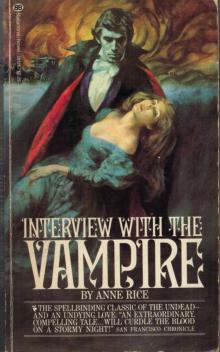 Interview with the Vampire
Interview with the Vampire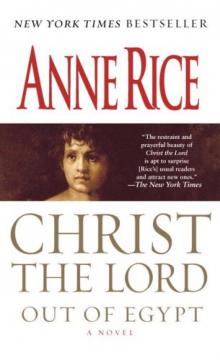 Christ the Lord: Out of Egypt
Christ the Lord: Out of Egypt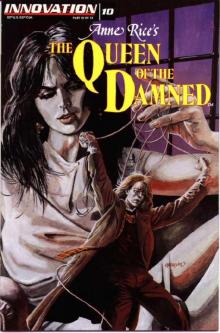 The Queen Of The Damned
The Queen Of The Damned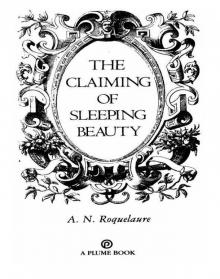 The Claiming of Sleeping Beauty
The Claiming of Sleeping Beauty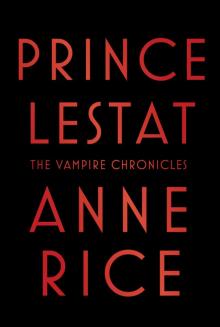 Prince Lestat
Prince Lestat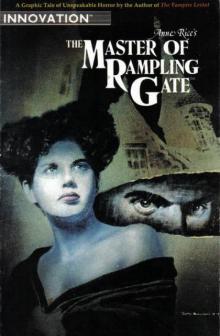 The Master of Rampling Gate
The Master of Rampling Gate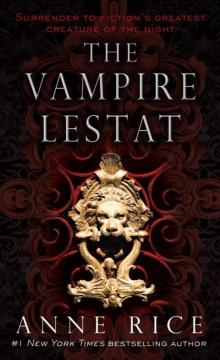 The Vampire Lestat
The Vampire Lestat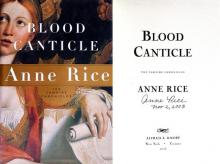 Blood Canticle
Blood Canticle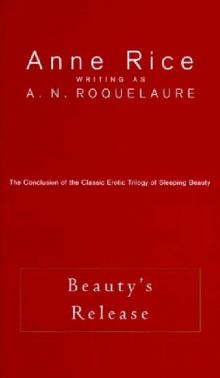 Beauty's Release
Beauty's Release Pandora
Pandora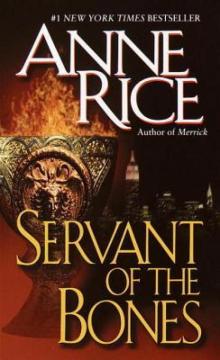 Servant of the Bones
Servant of the Bones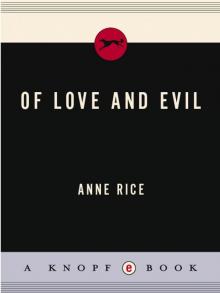 Of Love and Evil
Of Love and Evil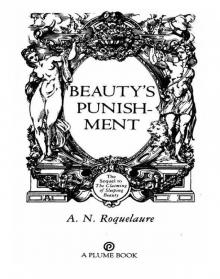 Beauty's Punishment
Beauty's Punishment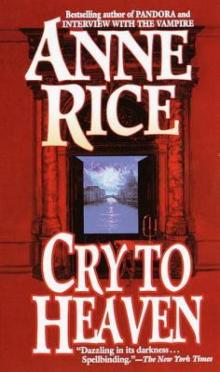 Cry to Heaven
Cry to Heaven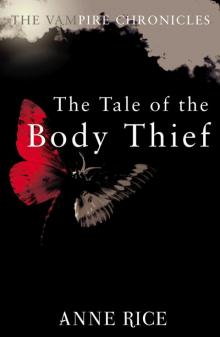 The Tale of the Body Thief
The Tale of the Body Thief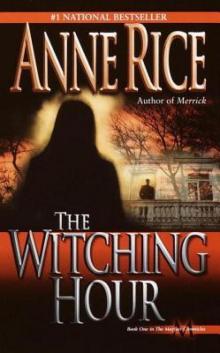 The Witching Hour
The Witching Hour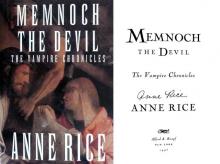 Memnoch the Devil
Memnoch the Devil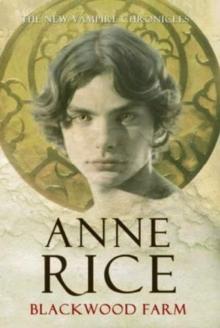 Blackwood Farm
Blackwood Farm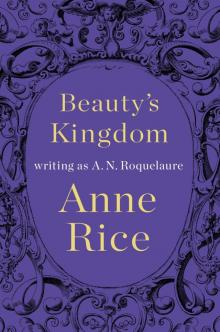 Beauty's Kingdom
Beauty's Kingdom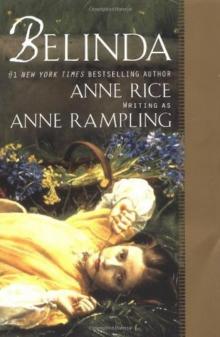 Belinda
Belinda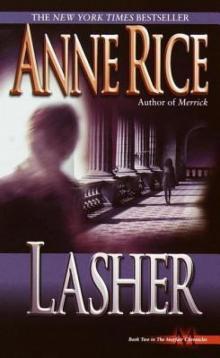 Lasher
Lasher Vittorio, the Vampire
Vittorio, the Vampire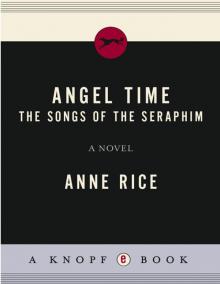 Angel Time
Angel Time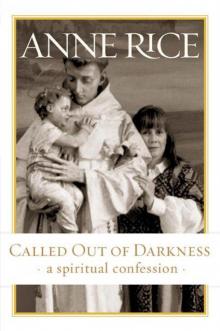 Called Out of Darkness: A Spiritual Confession
Called Out of Darkness: A Spiritual Confession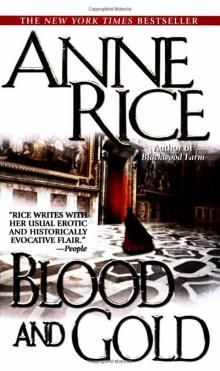 Blood And Gold
Blood And Gold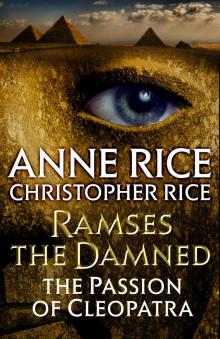 The Passion of Cleopatra
The Passion of Cleopatra Taltos
Taltos Exit to Eden
Exit to Eden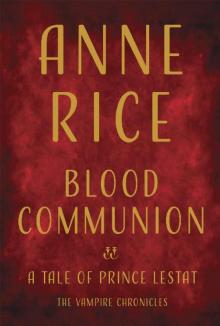 Blood Communion (The Vampire Chronicles #13)
Blood Communion (The Vampire Chronicles #13) The Wolf Gift
The Wolf Gift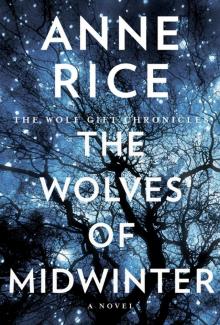 The Wolves of Midwinter
The Wolves of Midwinter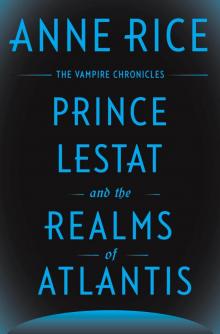 Prince Lestat and the Realms of Atlantis
Prince Lestat and the Realms of Atlantis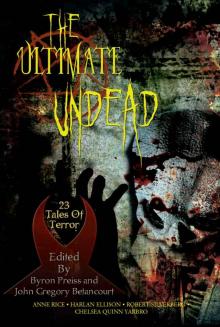 The Ultimate Undead
The Ultimate Undead The Vampire Lestat tvc-2
The Vampire Lestat tvc-2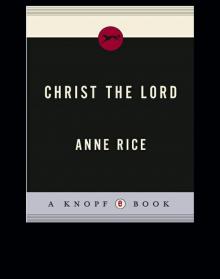 The Road to Cana
The Road to Cana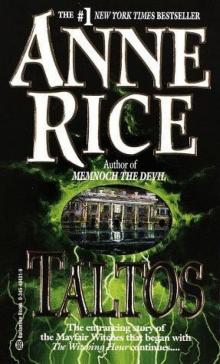 Taltos lotmw-3
Taltos lotmw-3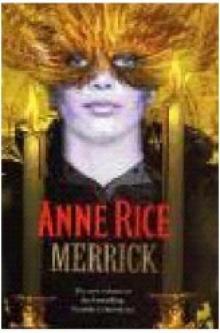 Merrick tvc-7
Merrick tvc-7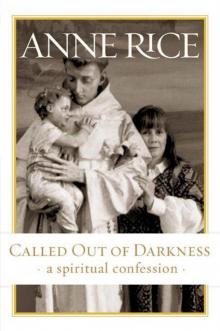 Called Out of Darkness
Called Out of Darkness Pandora - New Vampires 01
Pandora - New Vampires 01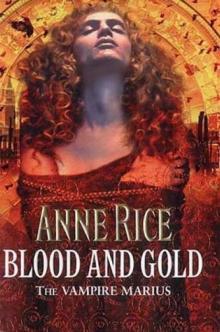 Bllod and Gold
Bllod and Gold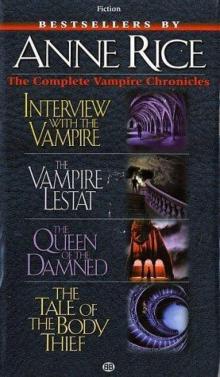 The Queen Of the Damned: Vampire Chronicles
The Queen Of the Damned: Vampire Chronicles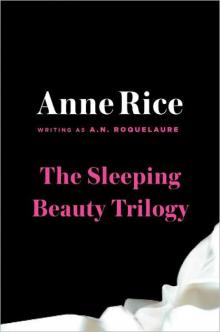 The Sleeping Beauty Trilogy
The Sleeping Beauty Trilogy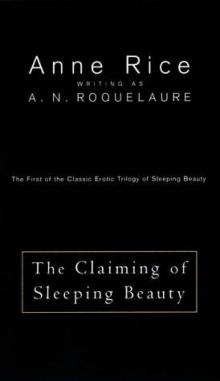 The Claiming of Sleeping Beauty b-1
The Claiming of Sleeping Beauty b-1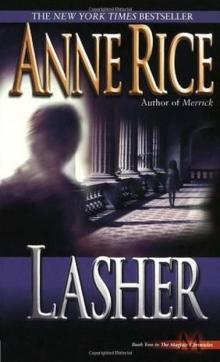 Lasher lotmw-2
Lasher lotmw-2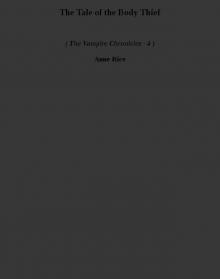 The Tale of the Body Thief tvc-4
The Tale of the Body Thief tvc-4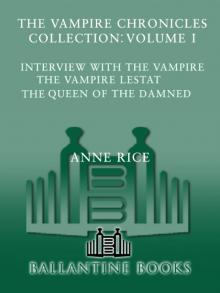 The Vampire Chronicles Collection
The Vampire Chronicles Collection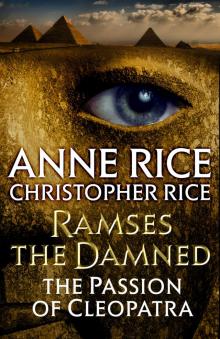 Ramses the Damned
Ramses the Damned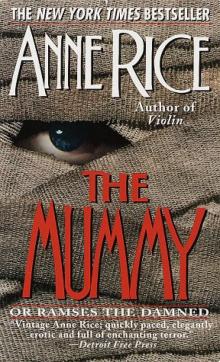 The Mummy - or Ramses the Damned
The Mummy - or Ramses the Damned Vittorio, The Vampire - New Vampires 02
Vittorio, The Vampire - New Vampires 02 The Vampire Armand tvc-6
The Vampire Armand tvc-6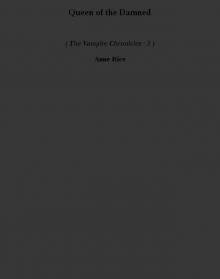 Queen of the Damned tvc-3
Queen of the Damned tvc-3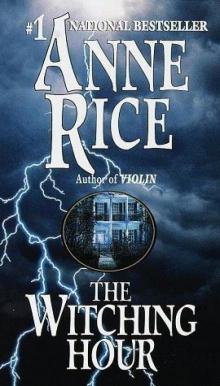 The witching hour lotmw-1
The witching hour lotmw-1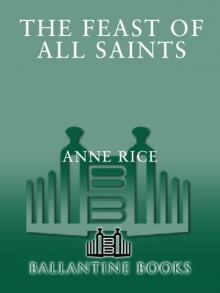 Feast of All Saints
Feast of All Saints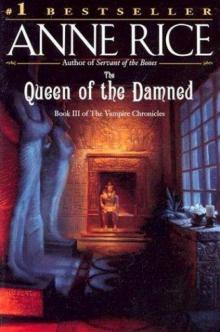 Queen of the Damned
Queen of the Damned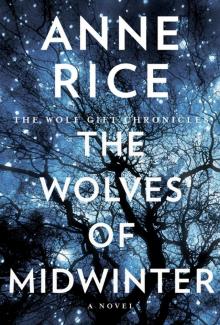 The Wolves of Midwinter twgc-2
The Wolves of Midwinter twgc-2 The Mummy
The Mummy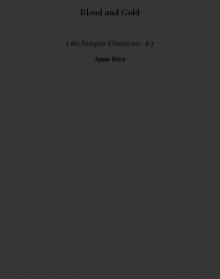 Blood and Gold tvc-8
Blood and Gold tvc-8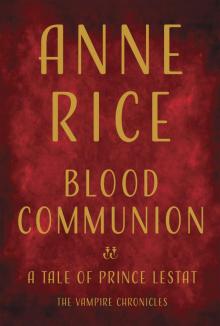 Blood Communion
Blood Communion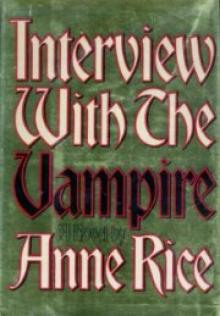 Interview with the Vampire tvc-1
Interview with the Vampire tvc-1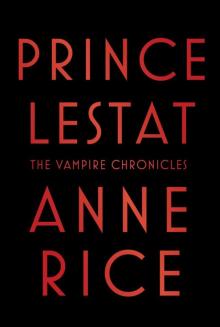 Prince Lestat: The Vampire Chronicles
Prince Lestat: The Vampire Chronicles